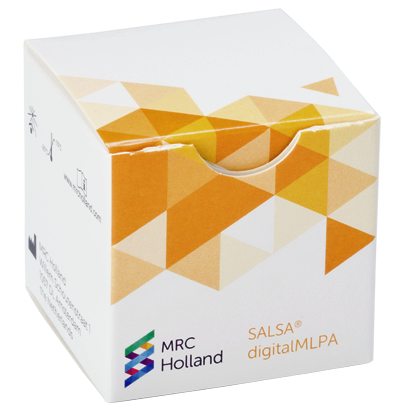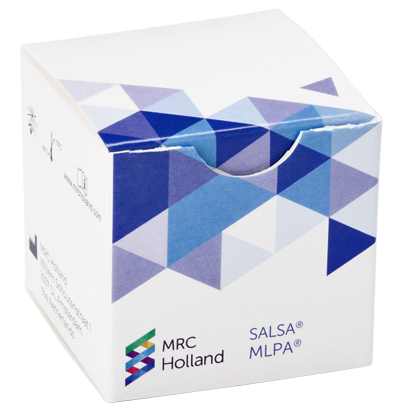IKZF1 gene, 7p12.2
Deletions or mutations of IKZF1 are significantly associated with an increased risk of relapse and adverse events in ALL patients (Mullighan et al. 2009a; Martinelli et al. 2009).
IKZF1plus profile
Deletions of IKZF1 in combination with deletions of CDKN2A, CDKN2B, PAX5 and the PAR1 region, and in the absence of ERG deletions, comprise a prognostic profile (IKZF1plus profile) that is associated with a very poor prognosis (Stanulla et al. 2018). Please note that this probemix does not cover all genes and regions included in the IKZF1plus profile. For detection of deletions of the ERG gene, SALSA MLPA probemixes P202 IKZF1-ERG and P327 iAMP21-ERG are available.
EBF1 gene, 5q33.3
EBF1 deletions are suggested to be an important factor in the relapse of ALL, as 25% of relapsed ALL cases have deletions in the EBF1 locus (Yang et al. 2008). Deletions of EBF1 are suggested to be associated with a higher risk of relapse (Olsson et al. 2014).
CDKN2A/2B genes, 9p21.3
Deletions of CDKN2A are present in 15-35% of childhood B-ALL and in 30-45% of adult B-ALL cases (Gonzáles-Gil et at. 2021). CDKN2A/2B deletions are more frequently found in high-risk patients of all ages, and the majority of studies on relapse ALL suggests that (homozygous) CDKN2A/2B deletions are more frequent at relapse than at diagnosis. Deletions of CDKN2A/2B are also part of the IKZF1plus profile (see section above).
PAX5 gene, 9p13.2
PAX5 deletions are present in 30% of B-progenitor ALL cases and in 50% of Ph+ ALL (Lejman et al. 2022; Li et al. 2021). Moreover, intragenic PAX5 amplifications were suggested to be present in a new subgroup of B-cell precursor ALL (~1%) and in 3% of B-other ALL cases, which is associated with poor outcome (Schwab et al. 2017). Deletions of PAX5 are also part of the IKZF1plus profile (see section above).
ETV6 gene, 12p13.2
ETV6 deletions are frequent in B-ALL (51%), and ETV6 is often involved in rearrangements and fusions detected in ALL patients (e.g. in ETV6-RUNX1 fusions) (Schwab et al. 2013). It is suggested that native ETV6 deletions in ETV6-RUNX1+ childhood ALL is associated with better prognosis (Ko et al. 2011). Although microdeletions often occur at the translocation breakpoints, this MLPA probemix will not detect all microdeletions in which ETV6 is involved.
BTG1 gene, 12q21.33
BTG1 deletions appear to be more frequent in high risk ALL cases and are often combined with other deletions (Fang et al. 2018). BTG1 deletions are detected with high frequency in ALL patients with Down syndrome (Lundin et al. 2012). As many deletions of BTG1 extend into the centromeric area of BTG1 into a gene poor region (Waanders et al. 2012), two downstream probes were included for the BTG1-area.
RB1 gene, 13q14.2
RB1 deletions have been reported to be more frequent in high risk ALL as compared to non-selected cases and often co-occur with other CNAs, in particular iAMP21 (Fang et al. 2018; Schwab et al. 2013; Steeghs et al. 2019). Deletions often involve one or more of the last 10 exons of this 27-exon gene (Schwab et al. 2013).
Xp22.33 / Yp11.32 (PAR1) region
This region shows recurrent aberrations in ALL (Harvey et al. 2010). CSF2RA/IL3RA deletions are frequent in ALL (7% of ALL cases; up to 55% in Down syndrome-associated ALL). Focal deletions within the P2RY8 and CRLF2 genes, resulting in a fusion gene, have been suggested to associate with a poor prognosis (Mullighan et al. 2009b). Deletions of the PAR1 region are also part of the IKZF1plus profile (see section above).







